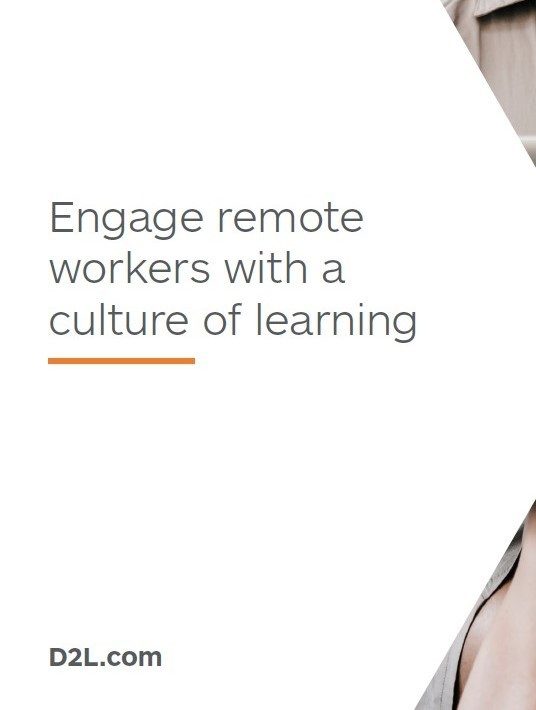eBook
Engage Virtual Workers With A Culture Of Learning
by D2L / Published: Feb 11 2021
What it's about
Companies need to tackle remote work issues like effective collaboration and access to resources. This eBook looks at three challenges that can accompany remote work and steps every organization can take to help build a vibrant culture of learning.
Key chapters
-
3 Challenges That Can Accompany Remote Work
As more organizations turn to partial or fully remote workforces, three common roadblocks emerge: making room for informal and relationship-building communication, providing equal access to valuable learning opportunities, and defining and building an intentional company culture. -
A Lack Of Informal Communication Opportunities
Technology has removed much of the stigma associated with formal remote meetings, as video-enabled conference calls and webchats allow team members to collaborate with relative ease. But replicating fleeting ad-hoc conversations can be more difficult. Unfortunately, failing to do this can eliminate critical opportunities for building relationships and sharing knowledge. -
Unequal Access To Learning
The same limits on informal relationship-building apply to Learning and Development. Although 55% of employees consider career growth and opportunity more important than salary, 47% of remote workers aren’t satisfied with their employer’s Learning and Development opportunities. -
The Scattered Development Of A Company Culture
Formalizing and building an intentional company culture can be challenging even when your team members rub shoulders with one another all day. When relationships are digital, it’s even more important that this isn’t allowed to happen by accident—because there’s a good risk it won’t happen at all. -
3 Strategies For Building A Vibrant Culture Of Learning With A Remote Team
It might be tempting to use the challenges of working remotely as an excuse to not embrace this evolution in the way we work, particularly after the pandemic has ended. Instead, they should highlight for us how critical it is to build a strong learning culture that encourages behaviors that alleviate and eliminate them: open communication, intentional culture development, and accessible learning opportunities. -
Involve Every Level Of Your Organization
A culture of learning cannot be a top-down executive initiative, nor can it be remote-only. Relying solely on either one of these will lead you out of alignment. -
Set Expectations Around Work And Learning
Organizations new to managing a remote workforce probably won’t be surprised that the remote employee experience will be different, but they may not expect how it will change—sometimes significantly. -
Make Your LMS The Center Of Community
The reality is that if you have even a single remote worker, your company culture and learning culture need to be remote too. And the only way to ensure you’re delivering an experience that meets the needs of on-site and off-site employees is to build your culture of learning in a central cloud-based Learning Management System (LMS). -
Modern Learning Is Remote Learning
Remote work, in full or in part, has become a reality for most organizations today. Organizations need to be ready to adapt to meet the evolving needs and expectations of current and future employees. A cornerstone of this is making sure people have access to the kinds of training and development that will improve their skills and advance their careers.
Recommend this read to your friends and #shareknowledge!
Get your copy now
Join other professionals like you, who have downloaded the eBook!
